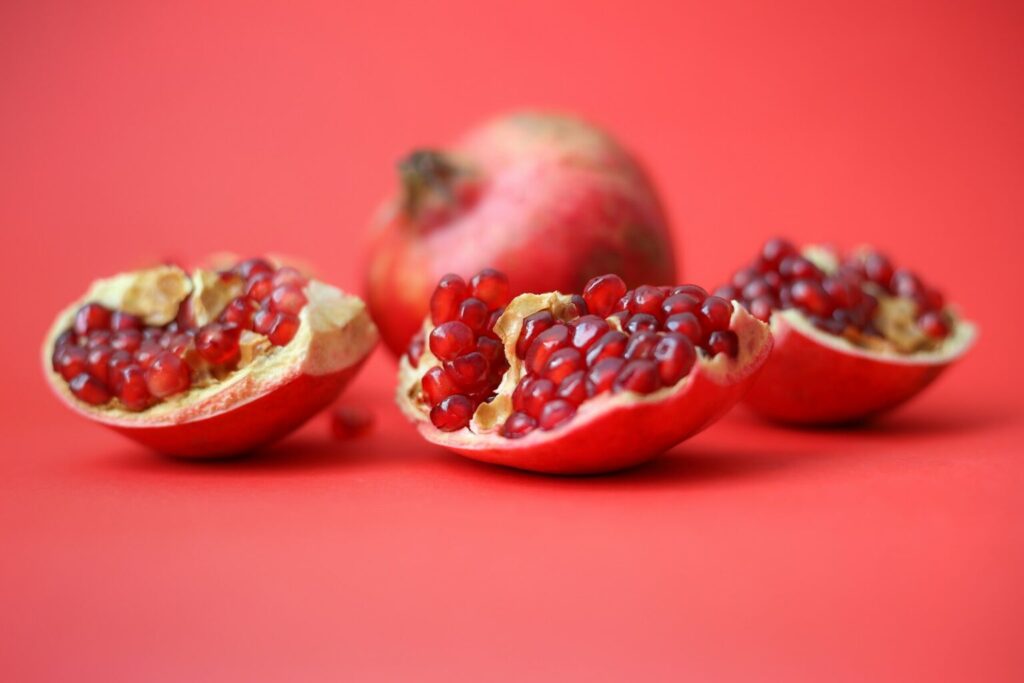Pomegranates, with their vibrant red arils and sweet-tart flavor, are more than just a delicious fruit—they’re a nutritional powerhouse. Known as a symbol of health and vitality in many cultures, pomegranates have been used for centuries in traditional medicine. Modern science has now confirmed what ancient healers knew: this superfruit is packed with antioxidants, vitamins, and minerals that offer a wide range of health benefits.
In this blog post, we’ll explore the incredible benefits of eating pomegranates and why you should consider adding them to your diet.
Nutritional Profile of Pomegranates
Pomegranates are low in calories but rich in essential nutrients. One cup of arils (seed sacs) contains:
- Calories: 144
- Fiber: 7 grams
- Protein: 3 grams
- Vitamin C: 30% of the Daily Value (DV)
- Vitamin K: 36% of the DV
- Folate: 16% of the DV
- Potassium: 12% of the DV
Pomegranates are also loaded with powerful antioxidants, particularly punicalagins and anthocyanins, which give the fruit its deep red color and many of its health benefits.
Top Health Benefits of Pomegranates
- Rich in Antioxidants
Pomegranates are one of the most antioxidant-rich foods available. These compounds help neutralize free radicals, reducing oxidative stress and inflammation in the body. This can lower the risk of chronic diseases like heart disease, cancer, and diabetes. - Supports Heart Health
Pomegranates have been shown to improve heart health in several ways:- They help lower blood pressure by promoting nitric oxide production, which relaxes blood vessels.
- They reduce LDL (bad) cholesterol oxidation, a key factor in the development of atherosclerosis (hardening of the arteries).
- They improve blood flow and prevent plaque buildup in arteries.
- Boosts Immune Function
The high vitamin C content in pomegranates strengthens the immune system, helping the body fight off infections and illnesses. The fruit’s antimicrobial properties also contribute to its immune-boosting effects. - Anti-Inflammatory Properties
Chronic inflammation is linked to many diseases, including arthritis, cancer, and heart disease. Pomegranates contain compounds that reduce inflammation, making them beneficial for individuals with inflammatory conditions. - May Help Prevent Cancer
Studies suggest that pomegranates may inhibit the growth of cancer cells, particularly in prostate, breast, and colon cancers. The fruit’s antioxidants and anti-inflammatory properties play a key role in this protective effect. - Improves Digestive Health
Pomegranates are a good source of dietary fiber, which supports healthy digestion and prevents constipation. The fruit also has anti-inflammatory effects that may help manage conditions like inflammatory bowel disease (IBD). - Supports Brain Health
The antioxidants in pomegranates can protect the brain from oxidative stress and inflammation, which are linked to neurodegenerative diseases like Alzheimer’s. Some studies suggest that pomegranate juice may improve memory and cognitive function. - Promotes Skin Health
Pomegranates are rich in vitamin C and antioxidants, which help protect the skin from sun damage, reduce signs of aging, and promote collagen production. The fruit’s anti-inflammatory properties can also help with conditions like acne and eczema. - May Enhance Exercise Performance
Pomegranates are rich in nitrates, which improve blood flow and oxygen delivery to muscles. This can enhance exercise performance and reduce muscle soreness after workouts. - Supports Joint Health
The anti-inflammatory properties of pomegranates can help reduce symptoms of arthritis and joint pain. Some studies suggest that pomegranate extract may protect cartilage and slow the progression of osteoarthritis.
How to Incorporate Pomegranates into Your Diet
Pomegranates are incredibly versatile and can be enjoyed in many ways:
- Eat the Arils Raw: Scoop out the seeds and enjoy them as a snack or add them to salads, yogurt, or oatmeal.
- Drink Pomegranate Juice: Opt for 100% pure pomegranate juice without added sugars for a concentrated dose of nutrients.
- Add to Smoothies: Blend pomegranate arils or juice into your favorite smoothie for a burst of flavor and nutrition.
- Use as a Topping: Sprinkle pomegranate seeds on desserts, pancakes, or savory dishes like roasted vegetables.
- Make a Sauce: Reduce pomegranate juice into a syrup to drizzle over meats, desserts, or cheese plates.
Potential Side Effects and Precautions
While pomegranates are generally safe for most people, there are a few considerations:
- Allergies: Some individuals may be allergic to pomegranates. If you experience itching, swelling, or difficulty breathing, discontinue use and seek medical attention.
- Medication Interactions: Pomegranate juice may interact with certain medications, such as blood thinners and blood pressure drugs. Consult your doctor if you’re on medication.
- High Sugar Content: Pomegranate juice can be high in natural sugars, so moderation is key, especially for individuals with diabetes.

Pomegranates are a true superfruit, offering a wide range of health benefits from boosting heart health to supporting skin and brain function. Their rich antioxidant content, combined with their delicious flavor, makes them a valuable addition to any diet.
Whether you enjoy them fresh, juiced, or as part of a recipe, pomegranates are a simple and tasty way to enhance your overall well-being

